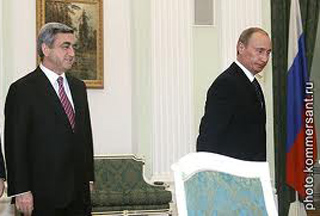“Why would the authorities care? They have been living well and are living well now too”

In parallel with the decline of activity in Armenia’s political sector, certain processes are happening around Armenia’s geopolitical situation. Namely, the Russian foreign minister Sergei Lavrorv made a statement containing “Azerbaijani territories” in reference to the Republic of Nagorno Karabakh, which was followed by a report that Armenian president Serzh Sargsyan was not going to participate in the summit of the Collective Security Treaty Organization in Bishkek. Yesterday we learnt that president Sargsyan was not going to participate in Eurasia Economic Commonwealth (AurAzEs) summit in Astana either. The president of Belarus Mr. A. Lukashenko participated in the summit above, too. It is worth mentioning that the Ukrainian president Viktor Yanukovich left for Astana, too.
There were debates about the issues above and experts say this is a boycott in answer to Lavrov’s announcement above and the increase of gas price. There are experts who claim that this summit was not of significant importance, so president Sargsyan’s failure to participate was not politically motivated. For example, in a press-conference political scientist Levon Shirinian said the refusal to take part in the summit was a demarche on the part of Serzh Sargsyan. In contrast, the head of the Union of Politicians of Armenia Mr. Hmayak Hovhannisyan said such estimation would be too exaggerated and said that the president’s decision not to participate in the summit was not a big deal.
We asked Sos Gimishyan, member of the Armenian National Congress alliance to comment on the mentioned issue, who noted that Serzh Sargsyan had refused to participate in a number of European summits too.
“I relate to it normally. Unfortunately Armenia’s impact on global geopolitical issues is very small. If a state is vulnerable from inside and there is crisis of legitimacy, participation does not change much,” said Sos Gimishyan. According to him, this can be a tactics and temporary confession that Armenia’s participation is not that important.
Concerning the increase of gas price and Lavrov’s statement Mr. Gimishyan said that “both are from the same source.” “This is the same foreign pressure. Certainly our authorities claim that there is no pressure and no problem, but such statements are both pressure and messages to incline Armenia toward a certain stance. Gas price increase is a direct pressure. Why would the authorities care? They have been living well and are living well now too. From the global prospective I do not see a political will and ability in Armenia to tackle all issues efficiently. We have survived and lived till now, so it is not so bad.”
Concerning the goal Russia pursues through pressure Gimishyan said: “It is obvious to me that when there is pressure from the West, it is a message that they want us to move towards the West and implement a policy according to that direction, and if there is pressure from Russia, it is an indirect direction to do things that are in the interests of Russia. There will always be such political actions involving us and the important thing for us is to have a strong country, united society with internal solidarity. In that case nobody will be scary to us – neither Russia, the United States and nor Europe – and we will be able to handle any challenges with the help of God. When there is unfair treatment, the country is divided and nothing good has remained from the country, any small wind blown from the North or West will shatter.”
Mr. Gimishyan believes the best of diplomacy Armenia figuring out which of the geopolitical directions of policy will bring more benefits for Armenia and Nagorno Karabakh conflict settlement: “I think the only policy we can have, whether connected with the West or North, is to figure out which of those two directions in foreign policy can bring more benefits to settlement of Karabakh conflict. Our choice should stem out from the choice of the best offer connected with the conflict. Certainly it s always good to have multilateral relations, but if the issue of Karabakh is involved, I would prefer the direction that is better for that issue first.”
Recently Jean-Claude Mignon, president of the PACE, made an announcement during his visit to Baku saying that 2013 can be decisive for Karabakh conflict settlement. Concerning this statement Mr. Gimishyan said, “We have been listening to such statements 18 years from now. I do not see any news and new approaches on the part of European institutions in general; I do not see any practical mechanisms that would give any solution to the issue of Karabakh conflict. Those are mere diplomatic and political statements.”
By Aram Sargsyan

























